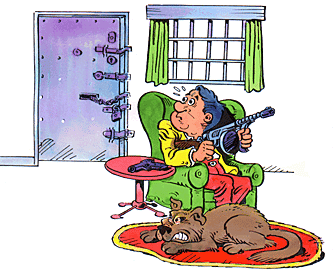biblioklept, biblioclept
(s) (noun); biblioklepts, biblioclepts
(pl)
A book thief or someone who steals books: Besides the direct
biblioklept there is the indirect thief who borrows and never returns books to their proper owners (including a library).
 Here is a news article about a bibliokleptomaniac.
Here is a news article about a bibliokleptomaniac.
bibliokleptomania, bibliocleptomania
(s) (noun); bibliokleptomanias, bibliocleptomanias
(pl)
1. A morbid tendency or compulsion to steal and to possess books.
2. A book thief who is regarded as someone who has a mental problem.

 A "private collector" acquires additional books for his personal library.
A "private collector" acquires additional books for his personal library.
 See another bibliokleptomaniac who was in the news.
See another bibliokleptomaniac who was in the news.
bibliokleptomaniac
(s) (noun), bibliokleptomaniacs
(pl)
1. A book thief who is often regarded as being insane.
2. Someone who has an uncontrollable or a compulsive desire to steal and possess books.
biological oxidation
Decomposition of complex organic materials by microorganisms.
It occurs in self-purification of water bodies and in activated sludge wastewater treatment.
clepsammia
(s) (noun), clepsammias
(pl)
A "sand" or "hour glass" that measures the trickling flow of sand. It is defined by some to mean: an "hourglass" that measures a period of time other than an hour.
The sand glass was one of the earliest methods by which man measured time. The invention of the hourglass is credited to a monk by the name of Luitprand from Chartres, France; sometime around the turn of 8th century.
Charlemagne is said to have had one that was so large that it had to be turned just once every twelve hours. He had divisions marked on the outside in order to measure the passage of the hours. Now, when people speak of the "sands of time passing", you should have a better idea of what is behind that statement.
clepsydra
(s) (noun) clepsydras, clepsydrae
(pl)
1. An ancient device that measured time by marking the regulated flow of water through a small opening; also called a water glass: The clepsydras were used in Egypt during c.2000 BC; then from Egypt, they were introduced into Greece and later from there into Rome.
2. Etymology: from Latin which came from Greek klepsudra; from kleps-, "to steal" + hudor, "water"; with the allusion that the water is flowing stealthily (flowing secretly) from it.
cleptobiosis, kleptobiosis
(s) (noun); cleptobioses, kleptobioses
(pl)
1. An association whereby one species regularly forages upon the food stores of another species, but otherwise does not associate with it.
2. Stealing, or robbing, food from other living creatures.
3. A form of symbiosis based on theft, best known in ants in which one species will systematically steal the collected food of another laboring species.
cleptomania, kleptomania
(s) (noun); cleptomanias, kleptomanias
(pl)

A click on this image will take you to an example of a
cleptomaniac in action.
cleptomania, kleptomania
(s) (noun); cleptomanias, kleptomanias
(pl)
An irresistible tendency to steal in which someone steals not because of necessity but as a result of some compulsion.
 A true story about a cleptomaniac or art thief.
A true story about a cleptomaniac or art thief.
cleptoparasite, kleptoparasite
(s) (noun); cleptoparasites, kleptoparasites
(pl)
An animal that obtains its food mainly by scavenging the food supplies of another species; especially, one with which it habitually lives in close proximity: A cleptoparasite is considered to be a hidden or unrecognized animal or plant that lives in or on a host (another animal or plant) and it obtains nourishment from the host without benefiting or killing the host.
cleptoparasitism, kleptoparasitism
(s) (noun); cleptoparasitisms, kleptoparasitisms
(pl)
A form of social organisms in which a member of one species steals the prey or food stores of another species to feed its own progeny: Cleptoparasitism is a relationship; such as, with some wasps, whereby the female regularly usurps the prey of the other one for purposes of rearing her own offspring.
cleptophobic, kleptophobic,
(adjective); more cleptophobic, more kleptophobic; most cleptophobic, most kleptophobic
Descriptive of the dread of thieves or of having something stolen: Susan became
kleptophobic after she had been robbed while out shopping.

In many cities around the world, crime is so rampant that many people are justly harpaxophobic or kleptophobic; that is, excessively fearful that their homes will be invaded by thieves. As a result, extreme precautions may be taken to keep unwelcome intruders from invading their homes.
cynoclept, cynoklept
(s) (noun); cynoclepts, cynoklepts
(pl)
Dog-stealing or a dog thief.
kleptic, cleptic
(adjective); more kleptic, more cleptic; most kleptic, most cleptic
A reference to being thievish or having strong tendencies to steal.
kleptistic, cleptistic
(adjective), more kleptistic, more cleptistic; most kleptistic, most cleptistic
Related to or referring to the practice of stealing.
![]() Here is a news article about a bibliokleptomaniac.
Here is a news article about a bibliokleptomaniac.

![]() See another bibliokleptomaniac who was in the news.
See another bibliokleptomaniac who was in the news.![]() A true story about a cleptomaniac or art thief.
A true story about a cleptomaniac or art thief.


